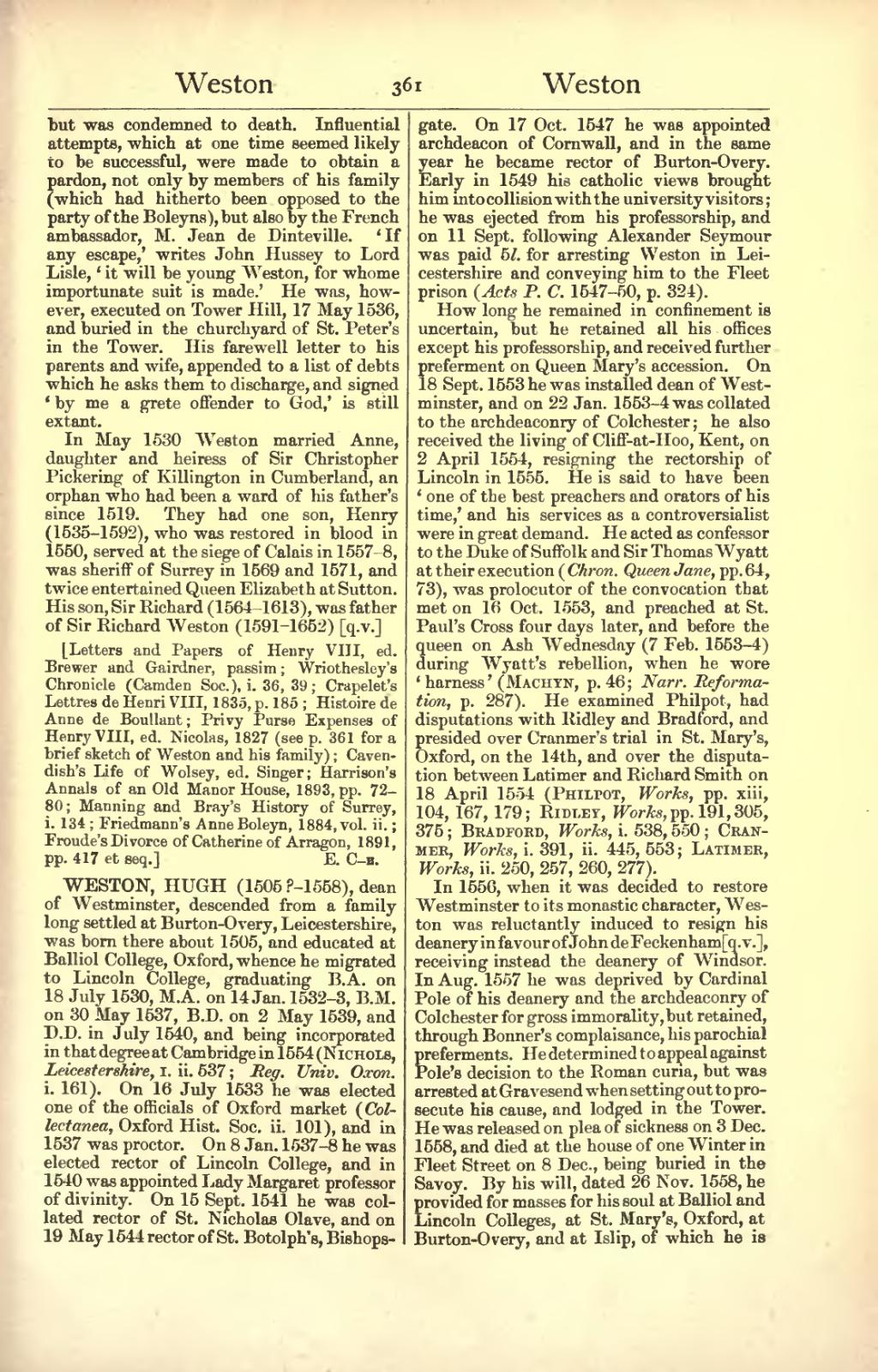but was condemned to death. Influential attempts, which at one time seemed likely to be successful, were made to obtain a pardon, not only by members of his family (which had hitherto been opposed to the party of the Boleyns), but also by the French ambassador, M. Jean de Dinteville. ‘If any escape,’ writes John Hussey to Lord Lisle, ‘it will be young Weston, for whome importunate suit is made.’ He was, however, executed on Tower Hill, 17 May 1536, and buried in the churchyard of St. Peter's in the Tower. His farewell letter to his parents and wife, appended to a list of debts which he asks them to discharge, and signed ‘by me a grete offender to God,’ is still extant.
In May 1530 Weston married Anne, daughter and heiress of Sir Christopher Pickering of Killington in Cumberland, an orphan who had been a ward of his father's since 1519. They had one son, Henry (1535–1592), who was restored in blood in 1550, served at the siege of Calais in 1557–8, was sheriff of Surrey in 1569 and 1571, and twice entertained Queen Elizabeth at Sutton. His son, Sir Richard (1564–1613), was father of Sir Richard Weston (1591–1652) [q. v.]
[Letters and Papers of Henry VIII, ed. Brewer and Gairdner, passim; Wriothesley's Chronicle (Camden Soc.), i. 36, 39; Crapelet's Lettres de Henri VIII, 1835, p. 185; Histoire de Anne de Boullant; Privy Purse Expenses of Henry VIII, ed. Nicolas, 1827 (see p. 361 for a brief sketch of Weston and his family); Cavendish's Life of Wolsey, ed. Singer; Harrison's Annals of an Old Manor House, 1893, pp. 72–80; Manning and Bray's History of Surrey, i. 134; Friedmann's Anne Boleyn, 1884, vol. ii.; Froude's Divorce of Catherine of Arragon, 1891, pp. 417 et seq.]
WESTON, HUGH (1505?–1558), dean of Westminster, descended from a family long settled at Burton-Overy, Leicestershire, was born there about 1505, and educated at Balliol College, Oxford, whence he migrated to Lincoln College, graduating B.A. on 18 July 1530, M.A. on 14 Jan. 1532-3, B.M. on 30 May 1537, B.D. on 2 May 1539, and D.D. in July 1540, and being incorporated in that degree at Cambridge in 1554 (Nichols, Leicestershire, I. ii. 537; Reg. Univ. Oxon. i. 161). On 16 July 1533 he was elected one of the officials of Oxford market (Collectanea, Oxford Hist. Soc. ii. 101), and in 1537 was proctor. On 8 Jan. 1537-8 he was elected rector of Lincoln College, and in 1540 was appointed Lady Margaret professor of divinity. On 15 Sept. 1541 he was collated rector of St. Nicholas Olave, and on 19 May 1544 rector of St. Botolph's, Bishopsgate. On 17 Oct. 1547 he was appointed archdeacon of Cornwall, and in the same year he became rector of Burton-Overy. Early in 1549 his catholic views brought him into collision with the university visitors; he was ejected from his professorship, and on 11 Sept. following Alexander Seymour was paid 51. for arresting Weston in Leicestershire and conveying him to the Fleet prison (Acts P. C. 1547-50, p. 324).
How long he remained in confinement is uncertain, but he retained all his offices except his professorship, and received further preferment on Queen Mary's accession. On 18 Sept. 1553 he was installed dean of Westminster, and on 22 Jan. 1553-4 was collated to the archdeaconry of Colchester; he also received the living of Cliff-at-Hoo, Kent, on 2 April 1554, resigning the rectorship of Lincoln in 1555. He is said to have been 'one of the best preachers and orators of his time,' and his services as a controversialist were in great demand. He acted as confessor to the Duke of Suffolk and Sir Thomas Wyatt at their execution (Chron. Queen Jane, pp. 64, 73), was prolocutor of the convocation that met on 16 Oct. 1553, and preached at St. Paul's Cross four days later, and before the queen on Ash Wednesday (7 Feb. 1553-4) during Wyatt's rebellion, when he wore 'harness' (Machyn p. 46; Narr. Reformation, p. 287). He examined Philpot, had disputations with Ridley and Bradford, and presided over Cranmer's trial in St. Mary's, Oxford, on the 14th, and over the disputation between Latimer and Richard Smith on 18 April 1554 (Philpot, Works, pp. xiii, 104, 167, 179; Ridley, Works, pp. 191, 305, 375; Bradford, Works, i. 538, 550; Cranmer, Works, i. 391, ii. 445, 553; Latimer, Works, ii. 250, 257, 260, 277).
In 1556, when it was decided to restore Westminster to its monastic character, Weston was reluctantly induced to resign his deanery in favour of John de Feckenham [q . v.], receiving instead the deanery of Windsor. In Aug. 1557 he was deprived by Cardinal Pole of his deanery and the archdeaconry of Colchester for gross immorality, but retained, through Bonner's complaisance, his parochial preferments. He determined to appeal against Pole's decision to the Roman curia, but was arrested at Gravesend when setting out to prosecute his cause, and lodged in the Tower. He was released on plea of sickness on 3 Dec. 1558, and died at the house of one Winter in Fleet Street on 8 Dec., being buried in the Savoy. By his will, dated 26 Nov. 1558, he provided for masses for his soul at Balliol and Lincoln Colleges, at St. Mary's, Oxford, at Burton-Overy, and at Islip, of which he is
